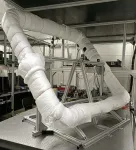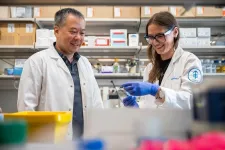(Press-News.org) Atlanta, GA—Sepsis is a life-threatening infection complication and accounts for 1.7 million hospitalizations and 350,000 deaths annually in the U.S. Fast and accurate diagnosis is critical, as mortality risk increases up to 8% every hour without effective treatment. However, the current diagnostic standard is reliant on culture growth, which typically takes 2-3 days. Doctors may choose to administer broad-spectrum antibiotics until more information is available for an accurate diagnosis, but these can have limited efficacy and potential toxicity to the patient.
In a study presented at ASM Microbe, a team from Day Zero Diagnostics unveiled a novel approach to antimicrobial susceptibility testing using artificial intelligence (AI). Their system, Keynome® gAST, or genomic Antimicrobial Susceptibility Test, bypasses the need for culture growth by analyzing bacterial whole genomes extracted directly from patient blood samples. The interim findings are based on studies that collected samples from 4 Boston-area hospitals.
Unlike traditional methods that rely on known resistance genes, the machine learning algorithms autonomously identify drivers of resistance and susceptibility based on data from a continuously growing large-scale database of more than 75,000 bacterial genomes and 800,000 susceptibility test results (48,000 bacterial genomes and 450,000 susceptibility test results at the time of this study). This allows for rapid and accurate predictions of antimicrobial resistance, revolutionizing sepsis diagnosis and treatment.
“The result is a first-of-its-kind demonstration of comprehensive and high-accuracy antimicrobial susceptibility and resistance predictions on direct-from-blood clinical samples,” said Jason Wittenbach, Ph.D., Director of Data Science at Day Zero Diagnostics and lead author on the study. “This represents a critical demonstration of the feasibility of rapid machine learning-based diagnostics for antimicrobial resistance that could revolutionize treatment, reduce hospital stays and save lives.”
The researchers say that further study is needed, given the limited sample size, but the findings could contribute to significant advancements in patient outcomes amid the rising threat of antimicrobial resistance and the need for rapid diagnosis and treatment of sepsis.
Funding for this research was provided in part by the Combating Antibiotic-Resistant Bacteria Biopharmaceutical Accelerator (CARB-X).
###
ASM Microbe is the annual meeting of the American Society for Microbiology, held June 13-17, 2024, in Atlanta, Georgia.
The American Society for Microbiology is one of the largest professional societies dedicated to the life sciences and is composed of 36,000 scientists and health practitioners. ASM's mission is to promote and advance the microbial sciences.
ASM advances the microbial sciences through conferences, publications, certifications, educational opportunities and advocacy efforts. It enhances laboratory capacity around the globe through training and resources. It provides a network for scientists in academia, industry and clinical settings. Additionally, ASM promotes a deeper understanding of the microbial sciences to diverse audiences.
END
AI enables faster, more effective antibiotic treatment of sepsis
2024-06-14
ELSE PRESS RELEASES FROM THIS DATE:
Quantum entanglement measures Earth rotation
2024-06-14
A team of researchers led by Philip Walther at the University of Vienna carried out a pioneering experiment where they measured the effect of the rotation of Earth on quantum entangled photons. The work, just published in Science Advances, represents a significant achievement that pushes the boundaries of rotation sensitivity in entanglement-based sensors, potentially setting the stage for further exploration at the intersection between quantum mechanics and general relativity.
Optical Sagnac interferometers are the most sensitive devices to rotations. They have been pivotal in our understanding of fundamental physics since the early years of the last century, contributing to establish ...
New rapid detection of bacteria in pediatric blood samples
2024-06-14
Atlanta, Ga. – June 14, 2023 – Researchers have demonstrated that a new technology could quickly and accurately diagnose bloodstream infections. The study findings were reported at ASM Microbe, the annual meeting of the American Society for Microbiology.
“There is a need to be able to rapidly and accurately diagnose bacteremia in newborn babies. They are especially susceptible to long-term morbidities and mortality the longer they go without treatment, or even with inaccurate treatment for bloodstream infections or sepsis,” said presenting study author April Aralar, Ph.D., a ...
Ex vivo gene editing and cell therapy for hereditary tyrosinemia type 1
2024-06-14
Background: We previously demonstrated the successful use of in vivo CRISPR gene editing to delete 4-hydroxyphenylpyruvate dioxygenase (HPD) to rescue mice deficient in fumarylacetoacetate hydrolase (FAH), a disorder known as hereditary tyrosinemia type 1 (HT1). The aim of this study was to develop an ex vivo gene-editing protocol and apply it as a cell therapy for HT1.
Methods: We isolated hepatocytes from wild-type (C57BL/6J) and Fah-/- mice and then used an optimized electroporation protocol to deliver Hpd-targeting CRISPR-Cas9 ribonucleoproteins into hepatocytes. Next, hepatocytes were transiently incubated in ...
Intranasal COVID-19 vaccine headed to clinical trials
2024-06-14
University of Georgia-based startup CyanVac LLC received federal funding to support a comparative Phase 2b clinical trial of CVXGA, the company’s intranasal vaccine candidates designed to protect against COVID-19.
As part of the award from Project NextGen, a federal initiative based in the U.S. Department of Health and Human Services (HHS), CyanVac will sponsor a randomized, double-blind Phase 2b study with 10,000 participants to compare the efficacy and safety of the intranasal vaccine against an FDA-approved mRNA-based COVID-19 vaccine.
The new vaccine is based on a viral delivery platform developed by He containing modified ...
High out-of-pocket costs may be barrier to filling naloxone prescriptions, study shows
2024-06-14
Patients are less likely to fill prescriptions for naloxone when they face increases in out-of-pocket costs, according to U-M researchers.
Patients are less likely to fill prescriptions for naloxone when they face increases in out-of-pocket costs, according to research by the University of Michigan.
Published in the Journal of the American Medical Association, the study utilized data from a national pharmacy transactions database from November 2020 to March 2021. Researchers found that about 1 in 3 naloxone ...
Sharks have depleted functional diversity compared to the last 66 million years
2024-06-14
New research by Swansea University and the University of Zurich has found that sharks retained high levels of functional diversity for most of the last 66 million years, before steadily declining over the last 10 million years to its lowest value in the present day.
Modern sharks are among the ocean’s most threatened species; yet have notably survived numerous environmental changes in their 250-million-year history. Today, their more than 500 species play many different ecological roles, from apex predators to nutrient transporters.
Ecological roles are determined by species’ traits such as body size, ...
Fasting primes the immune system’s natural killer cells to better fight cancer, new study in mice finds
2024-06-14
Periods of fasting reprogram the immune system’s natural killer cells to better fight cancer, according to a new study in mice from researchers at Memorial Sloan Kettering Cancer Center (MSK).
Fasting and other dietary regimens are increasingly being explored as ways to starve cancer cells of the nutrients they need to grow and to make cancer treatments more effective.
Now a team of researchers from MSK’s Sloan Kettering Institute and their collaborators have shown for the ...
Are patient partners a necessity in research?
2024-06-14
Sjögren’s disease is a systemic autoimmune disorder that often causes sicca symptoms – or dryness of the eyes and mouth, alongside many other complications such as fatigue, pain, and neurological manifestations. There are treatments that help with symptoms, but none that address the underlying disease processes.3 One key issue in developing new treatments is that Sjögren’s can differ from person to person – and that makes it hard to measure and compare outcomes in a clinical trial.
NECESSITY is an interventional trial looking at new clinical endpoints in Sjögren’s disease. ...
Encouraging cooperation in inflammatory arthritis
2024-06-14
Inflammatory arthritis describes a group of diseases caused by an overactive immune system. The different types of inflammatory arthritis include rheumatoid arthritis, psoriatic arthritis, juvenile idiopathic arthritis, and ankylosing spondylitis. The most common symptoms are joint pain and stiffness. Pain is the predominant symptom in the majority of people with inflammatory arthritis, which contributes to the global burden of rheumatic and musculoskeletal conditions.1 Knowledgeable support can reduce ...
Protection against disease and treatment toxicity
2024-06-14
Autologous hematopoietic stem cell transplantation (aHSCT) for SSc has been proven the most effective treatment strategy with regard to overall and event free survival in selected patients.2 But a key limitation is its toxicity, and new treatment options are needed. Two abstracts presented at the 2024 EULAR congress in Vienna focused on novel approaches.
Jörg Henes presented on behalf of the AST MOMA investigators. This prospective, open-label, study evaluated the feasibility of aHSCT in patients with impaired lung or heart function, and also ...


